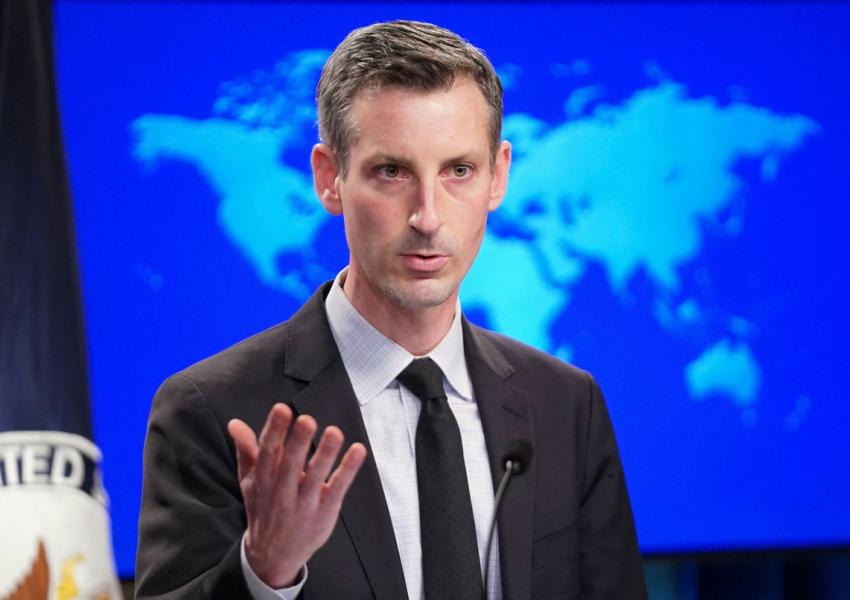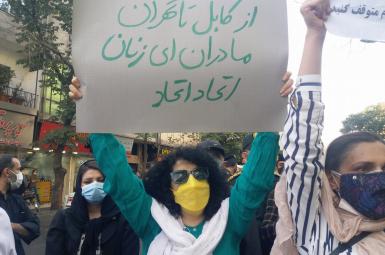
US Backs The Rights Of Iranians To Protest And Access Information
In a statement July 28, the United States Department of State spokesman Ned Price condemned “violence against peaceful protestors” in Iran and expressed concern about access to the internet.
"The Iranian people are now putting a spotlight not only on their unmet needs, but also their unfulfilled aspirations for respect for human rights − rights to which individuals the world over are entitled," the statement said. Iranians, it insisted, had a right to "voice their frustrations and hold their government accountable.”
The statement referred to “disturbing reports that security forces fired on protesters, resulting in multiple deaths” and expressed Washington’s support for “the rights of Iranians to peacefully assemble and express themselves, without fear of violence and detention by security forces."
The statement said that the US was monitoring reports of internet slowdowns and urged the Iranian government "to allow its citizens…to freely access information, including via the Internet."
Demands of Biden
Protests that began July 15 in Iran’s Khuzestan province, home to a large Arabic-speaking population, triggered by weeks-long water scarcity, led to anti-regime demonstrations and by Saturday spread to several large and small cities, including Tehran; the north-western city of Tabriz; the central city of Esfahan; Karaj, near Tehran; and Kermanshah in the west.
Iranian opposition activists in the US have demanded that, due to the suppression of protests, Washington break off talks over reviving the 2015 nuclear deal − the JCPOA, Joint Comprehensive Plan of Action − that have been taking place in Vienna since April. The Biden administration is continuing the ‘maximum pressure’ sanctions, introduced by President Donald Trump, that sent the Iranian economy into two years of deep recession.
Iran’s Supreme Leader Ali Khamenei July 23 acknowledged protestors’ grievances over water, but angry protesters in many places have chanted against him. In Bahrestan near Esfahan Tuesday evening they burned a banner of him and called for his death.
Amnesty International reported July 23 that in “mostly peaceful” protests in Khuzestan, security forces had killed “at least eight protestors and bystanders, including a teenage boy, in seven different cites” while a police officer had been shot dead in the port city of Mahshahr. The Iranian HRANA human rights group has listed ten deaths of which it said it had by July 24 confirmed five.
Senators’ Letter
In a letter to President Joe Biden this week, US Senators Tom Cotton, Chuck Grassley, Rick Scott, Marsha Blackburn, Marco Rubio, and Ted Cruz requested that a visa be refused for Iran’s incoming president Ebrahim Raisi (Raeesi) and senior Iranian officials to travel to New York for the 2021 opening of the United Nations General Assembly, which will convene September 14.
Raisi, who is due to take office on August 5, was like Zarif sanctioned by the Trump administration in 2019 for links to Iran’s supreme leader Ali Khamenei. In their letter, the senators cited Raisi’s role in the 1988 execution of thousands of political prisoners, mainly from the armed opposition group the Mujahideen-e Khalq, and the punishment of political protesters after the disputed 2009 presidential election.
The UN has disputed that the US has the right to refuse visas for foreign leaders to attend the General Assembly, citing the 1947 ‘headquarters agreement’ between the US and the UN. In 1988 the US blocked Yasser Arafat from New York, prompting the UN to move the General Assembly to Geneva to allow the Palestinian leader to address the assembly. In January 2020 Washington denied a visa to Iranian Foreign Minister Mohammad Javad Zarif that would have allowed him to attend a United Nations Security Council meeting in New York.









